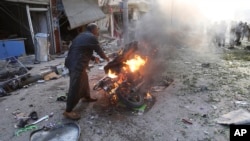Turkey's defense ministry said at least 13 people were killed Saturday in a car bombing near a market in the northern Syrian border town of Tal Abyad.
There was no immediate claim of responsibility, but the ministry blamed the attack on the Syrian Kurdish People's Protection Units (YPG), the Kurdish component of the Syrian Democratic Forces (SDF).
The ministry called on world leaders to take a stand against the YPG, describing it as a "cruel terror organization."
Turkey has designated the YPG a terrorist group, but the U.S. considers it a key ally in the fight against the Islamic State group.
Ankara seized control of Tal Abyad last month after the Turkish military and its allied Syrian militia launched an incursion into northeastern Syria against the SDF, following President Donald Trump's decision to withdraw U.S. troops from the region.
A 120-kilometer safe zone was established in Syria between the towns of Tal Abyad and Ras al-Ayn as part of an Oct. 17 cease-fire agreement between Turkey and the U.S. that also required the YPG's withdrawal from the area.
'Legitimate defense operations'
The Syriac Military Council, which is part of the SDF, said Saturday without claiming responsibility that "the SDF continues its legitimate defense operations against the ongoing attacks of the Turkish army and its jihadi factions in the eastern and southern areas of Ras al-Ayn, especially in the Khabour area and the villages around Tal Tamr."
On Friday, Turkish and Russian troops began patrolling northern Syria to ensure the withdrawal of Kurdish forces.
The U.N. has estimated that prior to the cease-fire, the incursion killed hundreds of people and displaced nearly 180,000 others.
Local doctors in northeast Syria told VOA that civilian deaths and injuries have continued since the cease-fire took effect.
"Although the cease-fire agreement has been signed between the U.S. and Turkey, as well as Russia and Turkey, the fighting has not stopped for a second," said Hesen MI Memmed, the head of Tal Tamr Hospital. "On the contrary, attacks have become more fierce and violent."
He expressed his concern that hospitals in the region were running out of medical supplies as the number of casualties continued to increase.




